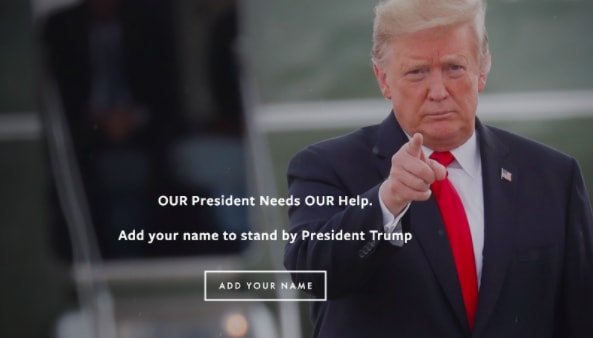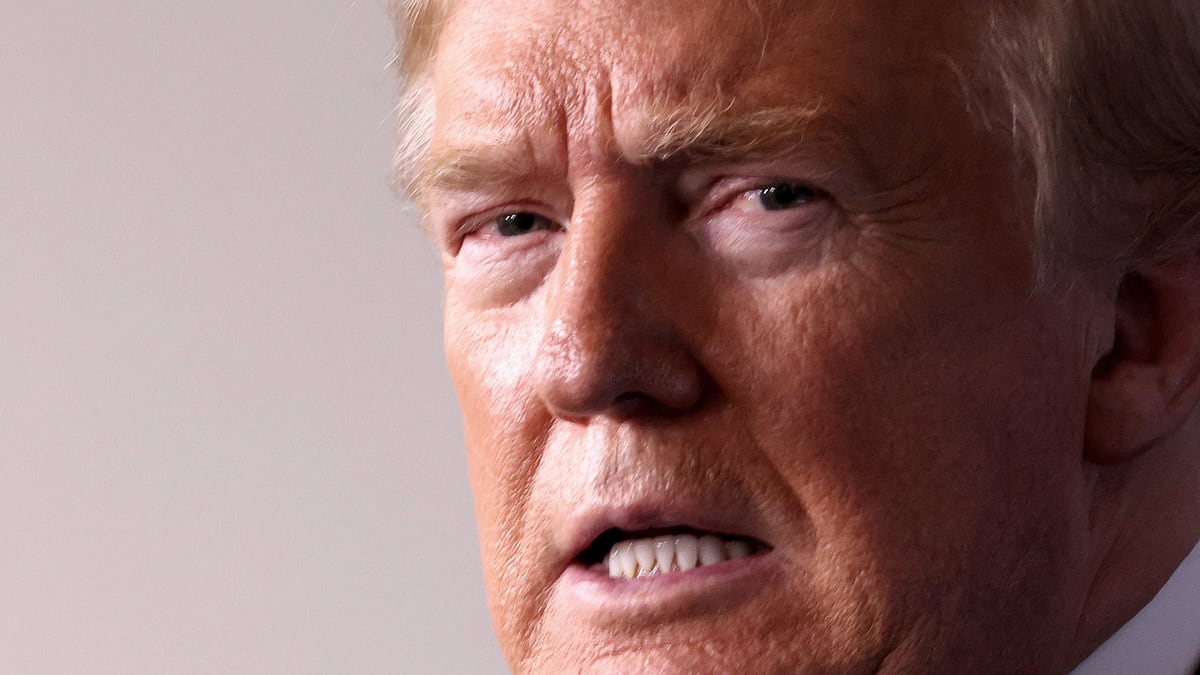By law, President Donald Trump’s campaign is not allowed to coordinate with a super PAC supporting it. But in recent months, one such ostensibly independent group has purchased access to one of the campaign’s most valuable possessions: the massive email list that it has built over the last five years.
The Trump campaign is renting out that list, and financial records indicate its top political customer is America First Action, the campaign’s “official” super PAC. The Trump campaign says it’s charging fair-market value for the list, which means the arrangement is likely above-board as far as federal election laws go. But it’s nonetheless a striking bit of convergence between Trump’s official re-election effort and a group that is supposed to operate independently of the campaign, and one that’s masked beneath layers of obscure financial transactions.
“This is further evidence that there is little distinction between President Trump’s campaign and his supposedly ‘independent’ super PAC,” said Brendan Fischer, the director of federal reforms at the Campaign Legal Center. “The super PAC effectively operates as an extension of the Trump campaign, and renting the campaign’s list further underscores how closely the two are working together.”
Subscribers to the Trump campaign’s email list might not have any idea how they ended up receiving messages from America First. Indeed, connecting those dots requires tracing the flow of money from America First through a network of consulting firms affiliated with a top consultant for the Republican National Committee and back to the Trump re-elect.
America First began sending out pro-Trump emails this year from a new web domain. The “from” field of the emails said they came from the address info@ourpresident45.com. Punch that domain into your web browser and you’re greeted by a bare-bones landing page overlayed across an image of Trump authoritatively pointing at the camera.

As it happens, the image is the same one that greets visitors to the Trump campaign’s online donation page—not another version of the same photo, but the exact same image file, according to unique identifiers in each photo, known as cryptographic hash codes, that act as something resembling digital fingerprints.
OurPresident45.com doesn’t say much about the website or who is behind it. But there is one clue in its privacy policy. It contains this line: “If you do not want to receive e-mail from us in the future, please let us know by sending us e-mail at info@excelsiorstrat.com.”
That web domain is associated with a low-key political vendor called Excelsior Strategies, which has received $260,000 in management consulting fees since last year from the Republican National Committee. According to The New York Times, Excelsior is run by Tom Newhouse, the vice president of digital marketing at Convergence Media, a top RNC consultancy.
The Times reported in 2018 that Excelsior had been tasked with renting out the Trump campaign’s behemoth voter list, estimated to contain the phone numbers and email address of some 20 million of Trump’s most devoted supporters. PAY DIRT reached out to Newhouse to get additional information about his firm’s work, but he declined to comment. America First also declined to comment. The Trump campaign did not respond to inquiries.
Since that Times report ran, Excelsior has passed along nearly $700,000 in list-rental income to the Trump campaign, representing revenue from Excelsior’s brokerage of the campaign’s database, minus the fees that the firm collects for itself. Those payments began in February 2019 and continued through at least February of this year.
Those records clearly spell out one end of the transaction: Excelsior is renting out the list and directing revenue back to the campaign. But they don’t show who the customers—the organizations renting the list from Excelsior—actually are.
When Excelsior first began renting out the Trump list, its customers paid the firm directly. Federal Election Commission records show it received list-rental income from the 2018 Senate campaigns of Republicans Bob Hugin in New Jersey and Dean Heller in Nevada as well as a super PAC supporting Sen. Martha McSally in Arizona, and the 2018 House campaigns of Rep. Ted Budd (R-NC) and New Mexico candidate Yvette Herrell.
Each of those committees paid Excelsior directly for access to the Trump list. But America First appears to have gone through a different firm called Convert Digital, which is incorporated at the same Virginia address and has the same registered agent as Excelsior. Like OurPresident45.com, Convert’s website contains little information about the company except for a telling line on a terms of service page: “For all questions about the services provided by this short code, you can send an email to contact@excelsiorstrat.com.”
And sure enough, America First paid about $335,000 to Convert in the second half of 2019, itemized as “digital fundraising” expenses, according to FEC records. It’s the only federal political committee that has reported paying Convert to date.
For each of Excelsior’s list-rental income payments to the Trump campaign, the campaign was sure to note in its FEC filings that it was paid fair-market value. That’s an important distinction: If America First had acquired the list at below-market rates, it would need to report that as a contribution from either Excelsior or the Trump campaign itself, which it hasn’t done.
As long as America First is paying the same rate that anyone else would, though, it’s considered a standard arms-length transaction. So long as America First and the Trump campaign aren’t strategizing about how the email list is used, that’s perfectly above-board legally.
But it does show how campaigns and supportive super PACs can maximize their value to each other while staying within those legal bounds. And according to Fischer, it demonstrates why rules governing super PAC coordination aren’t adequate to ensure that such groups are actually operating independently of the candidates they support.
“Big contributions made directly to candidates pose a significant risk of corruption, but the Supreme Court’s assumption in Citizens United was that independent spending could not be corrupt, and therefore could not be limited,” he explained. “But if there is little distance between a super PAC and a campaign, then million-dollar contributions to the super PAC are hardly distinguishable from million-dollar contributions directly to the candidate, and pose a similar risk of buying undue influence.”
The Trump campaign has already gone further than any of its predecessors in officially and publicly endorsing America First as the campaign’s preferred “independent” political group. Trump himself has appeared at the group’s fundraising events. And the super PAC and an affiliated dark-money nonprofit group, America First Policies, have paid millions of dollars to a company owned by Brad Parscale, Trump’s campaign manager.
The rental of the Trump campaign’s email list to America First is just another data point showing the campaign’s close relationship with its biggest independent backer. But it also points toward some more specifics about how, exactly, the campaign is using its resources to try to boost America First’s fundraising operation.
The initial America First email sent over the OurPresident45.com domain didn’t ask for money or petition signatures. It wanted something simpler. “America First Action is ready defend [sic] President Trump on the front lines of the political battlefield, but we need your help,” the email said. “Here’s how you can help: simply add us to your email address book—that’s all. Why? It will help our emails reach voters for Trump and help his reelection efforts!”
The email sounded more like an introduction than a call to arms, likely for the benefit of people who had signed up for Trump’s email list, but not America First Action’s. “Wouldn’t it be nice to have a specially designated group of patriots supporting President Trump’s policies and defending him from the barrage of attacks from far-left Democrats and their friends in the mainstream media?” it said. “Well, that is exactly what we’re doing.”
America First has sent about 20 emails from the OurPresident45.com address since then. And a close look at the messages indicates that the group is likely using Trump’s list to attempt to beef up its own database of small-dollar donors to hit up for contributions in the future.
That’s not explicit in the emails, but there are some definite clues. The links in each email to America First donation and petition pages, for instance, contain strings of characters that provide some insight into how those clicks are being used. Those links look something like this: https://secure.a1apac.org/stand-against-socialism/?datafields_sourceid=007&utm_source=Prospecting&utm_medium=SA-Email&utm_campaign=2020.03._NotAskingforMoney_AFA_SA&utm_content=Button&recurring=TRUE
There’s a crucial word buried in that seemingly incomprehensible mess: “prospecting.” In political fundraising, that’s when you hit up a list of people who have not yet received communications from or who have not donated to your group. It’s common for political committees to rent others’ email lists in order to prospect for new donors. People who do give are then added to what’s called the “house file,” or the list of known donors that can be contacted for contributions again in the future.
The Trump campaign is a small-dollar fundraising juggernaut. Its email list is perhaps the most valuable grassroots fundraising tool in American politics today. But super PACs generally rely on high-dollar donors simply because they’re unencumbered by individual contribution limits and can accept money from corporate entities. True to form, less than 2 percent of contributions to America First from its creation in 2017 through the end of 2019 came from donations of less than $200.
Heading into what is sure to be a bruising re-election contest, and facing off against a Democratic independent expenditure infrastructure that’s looking to raise hundreds of millions of dollars, America First is surely looking to beef up its small-dollar support as well. Now it has a tremendously powerful tool to do so, courtesy of the campaign with which it’s legally barred from coordinating.

